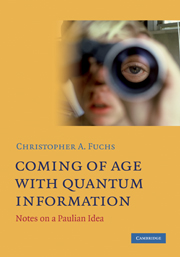Book contents
- Frontmatter
- Contents
- Foreword
- Introduction to the Cambridge University Press Edition
- Introduction to the Original ArXiv.org Posting
- Disclaimers
- Acknowledgements
- 1 Letters to David Baker
- 2 Letters to Howard Baker
- 3 Letters to Howard Barnum
- 4 Letters to Paul Benioff
- 5 Letters to Charlie Bennett
- 6 Letters to Herb Bernstein
- 7 Letters to Doug Bilodeau
- 8 Letters to Gilles Brassard
- 9 Letters to Jeffrey Bub
- 10 Letters to Carlton Caves
- 11 Letters to Greg Comer
- 12 Letters to Charles Enz
- 13 Letters to Henry Folse
- 14 Letters to Bob Griffiths
- 15 Letters to Adrian Kent
- 16 Letters to Rolf Landauer
- 17 Letters to Hideo Mabuchi
- 18 Letters to David Mermin
- 19 Letters to David Meyer
- 20 Letters to Jeff Nicholson
- 21 Letters to Michael Nielsen
- 22 Letters to Asher Peres
- 23 Diary of a Carefully Worded Paper: More Letters to Asher Peres
- 24 Letters to John Preskill
- 25 Letters to Joseph Renes
- 26 Letters to Mary Beth Ruskai
- 27 Letters to Rüdiger Schack
- 28 Letters to Robert Schumann
- 29 Letters to Abner Shimony
- 30 Letters to Jon Waskan
- 31 Letters to Bill Wootters
- 32 Letters to Anton Zeilinger
- 33 Other Letters
- Postpartum
- Index of Names
2 - Letters to Howard Baker
Published online by Cambridge University Press: 05 October 2012
- Frontmatter
- Contents
- Foreword
- Introduction to the Cambridge University Press Edition
- Introduction to the Original ArXiv.org Posting
- Disclaimers
- Acknowledgements
- 1 Letters to David Baker
- 2 Letters to Howard Baker
- 3 Letters to Howard Barnum
- 4 Letters to Paul Benioff
- 5 Letters to Charlie Bennett
- 6 Letters to Herb Bernstein
- 7 Letters to Doug Bilodeau
- 8 Letters to Gilles Brassard
- 9 Letters to Jeffrey Bub
- 10 Letters to Carlton Caves
- 11 Letters to Greg Comer
- 12 Letters to Charles Enz
- 13 Letters to Henry Folse
- 14 Letters to Bob Griffiths
- 15 Letters to Adrian Kent
- 16 Letters to Rolf Landauer
- 17 Letters to Hideo Mabuchi
- 18 Letters to David Mermin
- 19 Letters to David Meyer
- 20 Letters to Jeff Nicholson
- 21 Letters to Michael Nielsen
- 22 Letters to Asher Peres
- 23 Diary of a Carefully Worded Paper: More Letters to Asher Peres
- 24 Letters to John Preskill
- 25 Letters to Joseph Renes
- 26 Letters to Mary Beth Ruskai
- 27 Letters to Rüdiger Schack
- 28 Letters to Robert Schumann
- 29 Letters to Abner Shimony
- 30 Letters to Jon Waskan
- 31 Letters to Bill Wootters
- 32 Letters to Anton Zeilinger
- 33 Other Letters
- Postpartum
- Index of Names
Summary
29 September 1997, “Quantum Information Questions”
I think I'll answer your questions somewhat out of the order in which you asked them. I hope you don't mind: it may fit what I'm thinking more closely that way.
Bakercise 1:How important do you think these papers are to Quantum Information and the quantum technologies (computing, communication, cryptography and teleportation)? Are they a major step forward? And if so, why?
In my opinion, the Holevo–Schumacher–Westmoreland (HSW) result was the most technically difficult one in Quantum Information Theory to be proved last year. In the long run, the papers are certain to be classics. As far as importance goes, it was certainly one of the top two results (the other being a consortium of papers to do with fault-tolerant computation on quantum computers).
The HSW papers solve a long-standing problem that was on Holevo's mind as early as 1978. Holevo actually had a paper conjecturing this result in 1979, but somehow it escaped all of our attention until Richard Jozsa and I met him last September in Japan. He told us of the old paper then. (I've done a citation search since then, and, believe it or not, this paper had only been cited five times in its life.
- Type
- Chapter
- Information
- Coming of Age With Quantum InformationNotes on a Paulian Idea, pp. 10 - 19Publisher: Cambridge University PressPrint publication year: 2011



